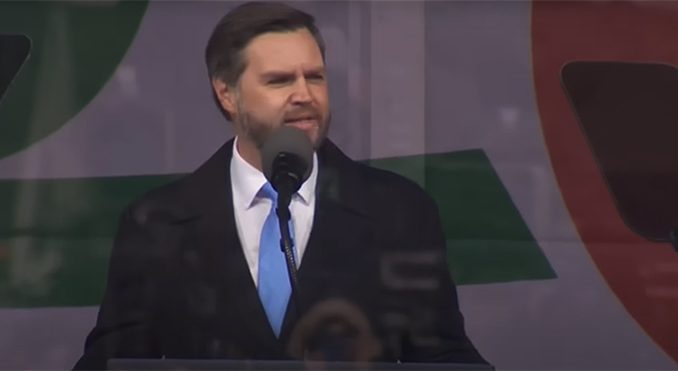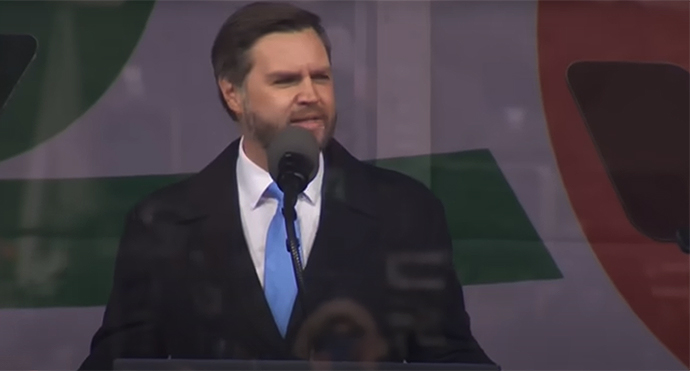
Vice President JD Vance is currently the rock star of the conservative Catholic world. His youth, style, upbringing, conversion, young family, and proximity to President Donald Trump have collided to make him the runaway favorite in a CPAC poll ranking the potential 2028 GOP presidential candidates.
When Vance was announced as a special speaker at the March for Life on January 24, 2025, he instantly overshadowed the previously announced keynote, Governor Ron DeSantis, a fellow Catholic and one of the most successful pro-life politicians our nation has known.
It would not be a surprise, then, if several Catholic colleges hope to invite Vance to deliver a commencement address and receive an honorary degree this May.
But should they? Can they?
In 2004, the American bishops issued the 2004 letter Catholics in Political Life that offered instructions on how Catholics should combat abortion in the public arena. The letter included a strong prohibition:
The Catholic community and Catholic institutions should not honor those who act in defiance of our fundamental moral principles. They should not be given awards, honors or platforms which would suggest support for their actions. (Emphasis in original.)
The choice of commencement speakers and honorary degree recipients falls under this directive. Each spring for two decades, certain Catholic universities have defied the bishops’ directive and invited abortion-supporting public figures and politicians. Most prominently, the University of Notre Dame invited President Barack Obama to give the commencement address in 2009. The university faced tremendous pressure internally and externally to rescind the invitation, yet President Obama spoke anyway and received an honorary Doctor of Laws degree.
In some instances, bishops have pressed universities to rescind these ill-advised invitations. On rare occasions, they triumphed, as did Bishop Robert McManus of Worcester, Massachusetts, in 2012, over Anna Maria College.
For politicians supporting abortion, the case against their participation in commencement and their reception of honors is straightforward. Their public stance directly contradicts the Church’s clear teaching concerning an intrinsically evil action. Typically, they not only support abortion but also declare themselves proudly in favor of “women’s rights” and “reproductive freedom.” Often, they even refuse limits on abortion, from mandatory waiting periods to parental notifications to protections for babies who survive botched abortions. In their public roles, they function as agents of the culture of death.
Vance, by contrast, presents a unique case. On the one hand, as I detailed here in August, Vance was a proudly pro-life senator for two years until he was selected as President Trump’s running mate. Then he quickly adopted Trump’s pro-choice views: he expressed his clear support for mifepristone, the abortion drug, as well as his support for IVF.
With these positions, he placed himself squarely at odds with Church teaching. On these grounds, he should not be honored by a Catholic institution.
Yet since being sworn in as vice president, Vance has enthusiastically jumped back into the pro-life camp. His speech at the March for Life was brilliant. He commended marchers for coming “to celebrate our movement,” pointing to himself as he said this. He then articulated the movement’s mission, again including himself within it:
We march to protect the unborn; we march to proclaim and live out the sacred truth that every single child is a miracle and a gift from God…. Now the task of our movement is to protect innocent life. It’s to defend the unborn and it’s also to be pro-family and pro-life in the fullest sense of that word possible.
He then called for the building of a culture of life in America, a culture that the government should help support:
So let me say very simply: I want more babies in the United States of America. I want more happy children in our country, and I want beautiful young men and women who are eager to welcome them into the world and eager to raise them. And it is the task of our government to make it easier for young moms and dads to afford to have kids, to bring them into the world and to welcome them as the blessings that we know they are here at the March for Life.
He concluded with this: “But one of the things that being a father has taught me, and one of the things that being in politics has taught me over the last couple of years, is that it is a blessing to know the truth. And the truth is that unborn life is worthy of protection.”
Who, then, is the real JD Vance? The one on the campaign who, to win an election, deemed unborn life dispensable? Or the one who declared that it is the truth that unborn life is worthy of protection? The vice president is a political enigma: an abortion-supporting politician who desires “to protect innocent life” and “to defend the unborn.”
Certainly, the Vance of the March for Life is worthy of honor from Catholic institutions. The Church proudly honors many saints who sinned horribly in their past, yet later went on to perform heroic works for God.
These saints, though their sins and their later accomplishments vary, have one thing in common: they all repented of their sins. They asked God for forgiveness, which was the necessary precondition for their conversion and subsequent growth in sanctity.
Vance, given his public stature and how widespread his abortion and IVF-supporting campaign statements have traveled, has to follow the example of these saints and repent publicly of his immoral stands to eliminate the scandal they caused. He need not do this dressed in sack cloth and sitting in ashes. Any tactic, even a subtle one, he chooses to renounce these immoral positions will do, as long as the faithful understand that he has done so.
Then, and only then, can Catholic colleges pay the vice president the honors that he will truly deserve if he can live up to his own lofty rhetoric delivered at the March for Life.
If you value the news and views Catholic World Report provides, please consider donating to support our efforts. Your contribution will help us continue to make CWR available to all readers worldwide for free, without a subscription. Thank you for your generosity!
Click here for more information on donating to CWR. Click here to sign up for our newsletter.





